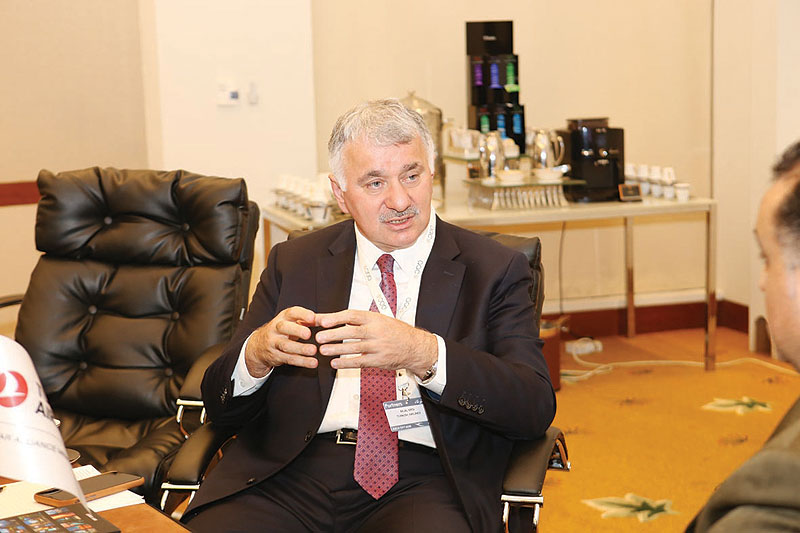
KUWAIT: The Arab Air Carriers Organization (AACO) held its 52nd annual general meeting yesterday at Jumeirah Messilah Beach Hotel under the patronage of His Highness the Prime Minister Sheikh Jaber Al-Mubarak Al-Hamad Al-Sabah. The meeting was hosted by Kuwait Airways. "In light of the rapid developments taking place in the world, we look forward to opening greater horizons for the future that will contribute to the drawing of a historical map of Arab airlines to promote the sustainable development of the Arab world more fully," Finance Minister Nayef Al-Hajraf said in his opening speech. "We, as government officials and Arab society, should cooperate to achieve success and economic security for our peoples by confronting challenges, overcoming difficulties and promoting the concept of the common Arab market," he added.
Chairman of Kuwait Airways Yousef Al-Jassem said Kuwait Airways is in line with the Arab Air Transport Association since 1965, adding that the Arab air transport sector is playing its part as a major engine for the economies of Arab countries and also for the economies of the countries that Arab airlines operate in. Jassem noted the air transport sector and Arab air transport in particular deal with vital issues, as there are many geopolitical events in the Arab world and around the world, along with weak economic growth.
"Let me list some of the pivotal issues that we think are important to deal with, such as operational restrictions in air transport services agreements and the ability of airlines to fully play their economic role. Also, the infrastructure of airports and air capacity, which is in urgent need of expansion and development to meet the expected growth in travel and air freight traffic. This is in addition to protectionist policies by some countries around the world that spoil the competitive balance between airlines, high fees to use airports around the world, high taxes imposed on the air transport sector, environmental obligations of airlines and visa restrictions in most countries," Jassem said.
"In the aviation sector, we have witnessed significant growth on the global level since 2010, averaging at 6 percent annually in passenger numbers, which resulted in the global number of passengers to reach 4.4 billion last year. This has allowed airlines, especially in the United States, to achieve for the first time returns on investment that are equal to or greater than normal returns on investment in other sectors," Secretary-General of the Arab Air Carriers Organization Abdul Wahab Teffaha said.
"Now we see that the global air transport industry, through a limited number of big players, has been able to enhance and optimize its operations, where its average load factor reached 82 percent last year, which translates into better ability to protect yields compared to a situation with additional excessive capacity over demand," he said.
On the Arab level, he added the Arab air transport has been growing well since 2010, with Arab airlines' RPKs increasing between 2010 and 2018 by an annual average of 10.1 percent, where during that same period, traffic at Arab airports also increased by an annual average of 6.8 percent. AACO members' traffic share of transit passengers from their total passengers also increased from 10.5 percent in 2010 to 14.3 percent in 2018, putting Arab airlines on the global aviation map.
For Alexandre de Juniac, Director General and CEO of International Air Transport Association (IATA), said: "Aviation has been driving climate action for over a decade. We committed to improving fuel efficiency by an average of 1.5 percent annually between 2009 and 2020. We are achieving 2.3 percent. We also committed to carbon-neutral growth from 2020. The ICAO Assembly confirmed its resolve to make a success of CORSIA - the carbon reduction and offsetting scheme for international aviation. It is the global measure that will enable us to cap net emissions and it will generate some $40 billion in climate funding over the lifetime of the scheme."
On the sidelines of the meeting, Bilal Eksi, CEO of Turkish Airlines, told Kuwait Times that passenger demand in Kuwait is increasing by 10 percent yearly because many Kuwaitis are visiting Turkey as tourists and to check on their properties there. "We have more than 10 flights weekly between Turkey and Kuwait, where it is the strength of the relationship between both sides. And it's easier now with the new airport that has a huge capacity," he said.
He said Turkish Airlines recently signed a new codeshare agreement with Kuwait Airways, adding that this codeshare agreement is expected to provide great opportunity for passengers from Kuwait and Turkey, where both companies will work closely to offer the best services to passengers and improve customer experience.
By Faten Omar




